Unit 4 I used to be afraid of the dark. Section A 3a-3c课件(28张PPT)2022-2023学年人教新目标版英语九年级全一册
文档属性
| 名称 | Unit 4 I used to be afraid of the dark. Section A 3a-3c课件(28张PPT)2022-2023学年人教新目标版英语九年级全一册 | 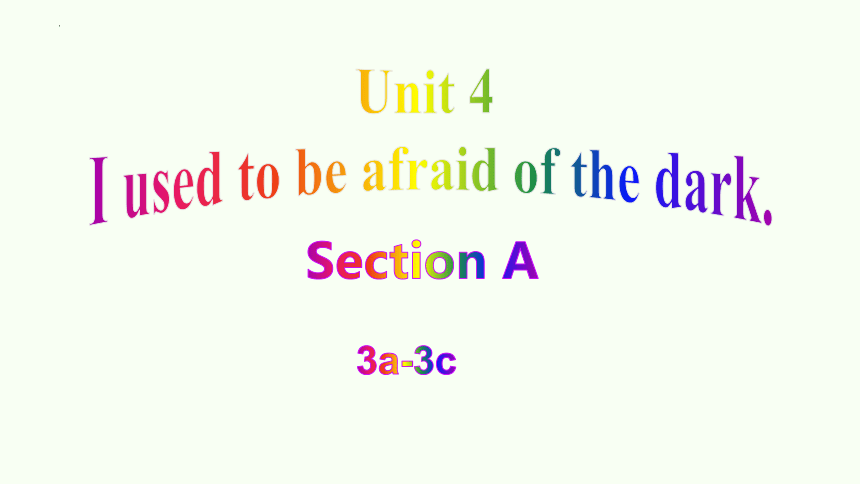 | |
| 格式 | pptx | ||
| 文件大小 | 2.0MB | ||
| 资源类型 | 教案 | ||
| 版本资源 | 人教新目标(Go for it)版 | ||
| 科目 | 英语 | ||
| 更新时间 | 2023-08-01 08:55:15 | ||
图片预览

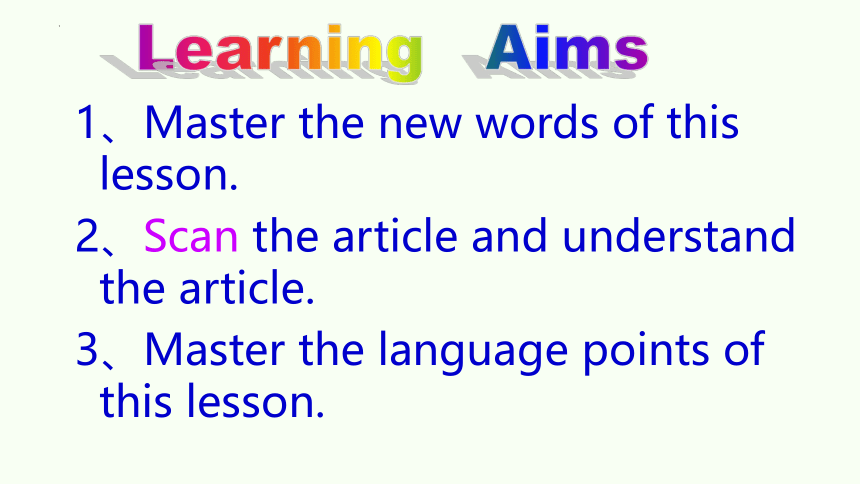
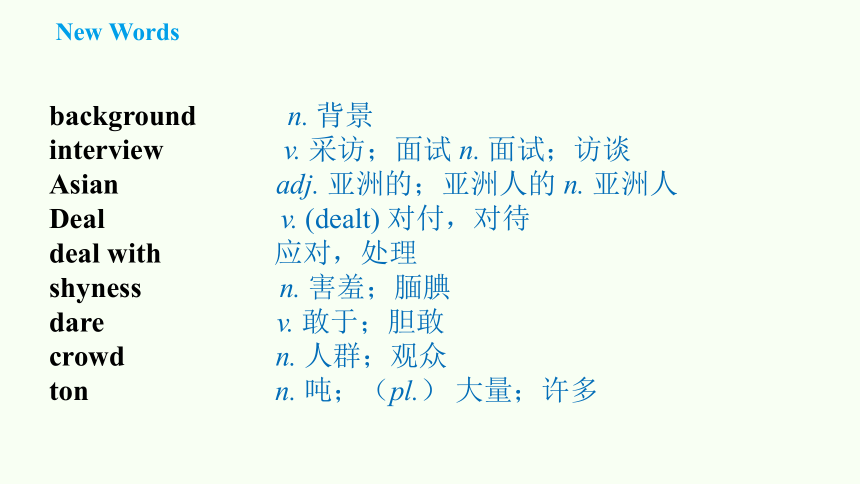
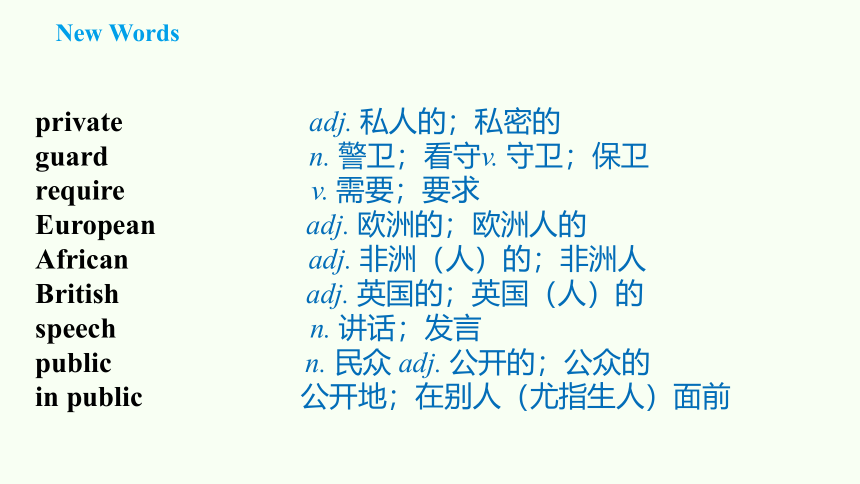


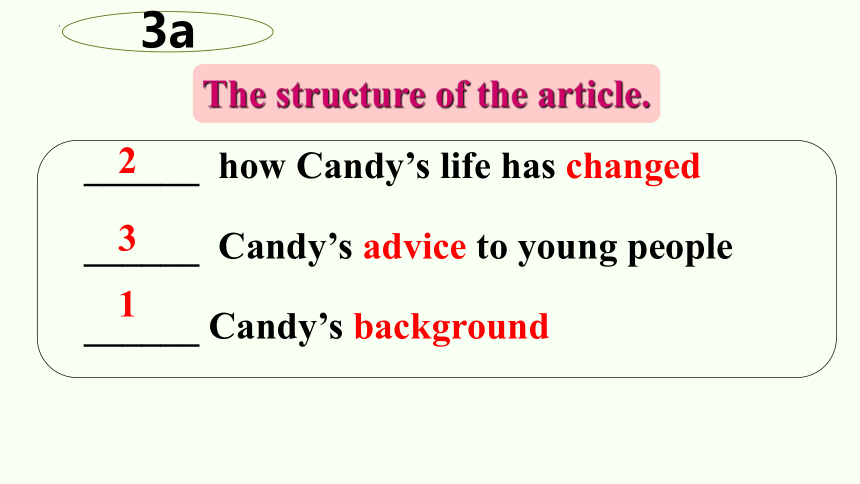
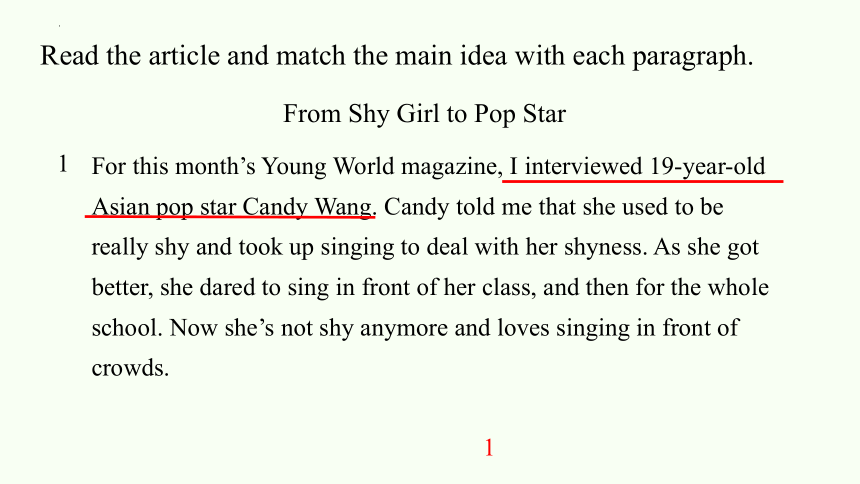
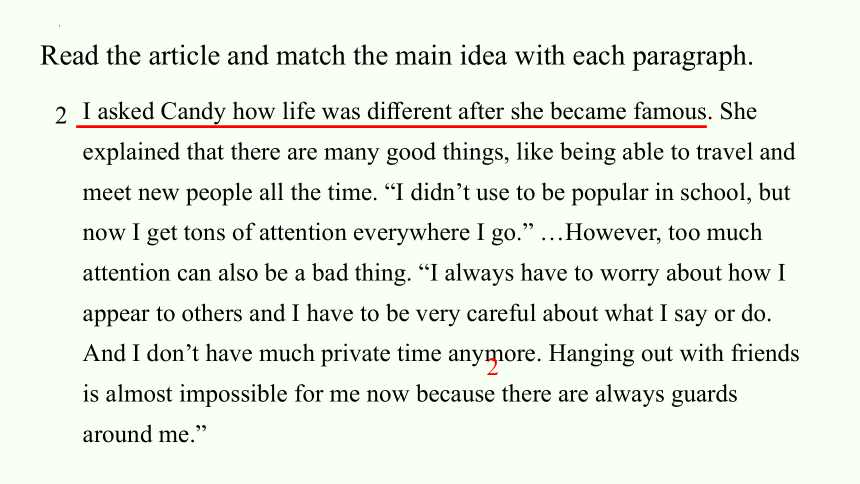
文档简介
(共28张PPT)
Section A
Unit 4
I used to be afraid of the dark.
3a-3c
Learning Aims
1、Master the new words of this lesson.
2、Scan the article and understand the article.
3、Master the language points of this lesson.
New Words
background n. 背景
interview v. 采访;面试 n. 面试;访谈
Asian adj. 亚洲的;亚洲人的 n. 亚洲人
Deal v. (dealt) 对付,对待
deal with 应对,处理
shyness n. 害羞;腼腆
dare v. 敢于;胆敢
crowd n. 人群;观众
ton n. 吨;(pl.) 大量;许多
New Words
private adj. 私人的;私密的
guard n. 警卫;看守v. 守卫;保卫
require v. 需要;要求
European adj. 欧洲的;欧洲人的
African adj. 非洲(人)的;非洲人
British adj. 英国的;英国(人)的
speech n. 讲话;发言
public n. 民众 adj. 公开的;公众的
in public 公开地;在别人(尤指生人)面前
Revision
Please use “used to … , but now …” to describe the changes.
She used to short and weak, but now she is a famous diver.
Look and say
She used to be short, but now she is tall .
The structure of the article.
______ how Candy’s life has changed
______ Candy’s advice to young people
______ Candy’s background
3
2
1
3a
From Shy Girl to Pop Star
For this month’s Young World magazine, I interviewed 19-year-old Asian pop star Candy Wang. Candy told me that she used to be really shy and took up singing to deal with her shyness. As she got better, she dared to sing in front of her class, and then for the whole school. Now she’s not shy anymore and loves singing in front of crowds.
1
Read the article and match the main idea with each paragraph.
1
I asked Candy how life was di erent after she became famous. She explained that there are many good things, like being able to travel and meet new people all the time. “I didn’t use to be popular in school, but now I get tons of attention everywhere I go.” …However, too much attention can also be a bad thing. “I always have to worry about how I appear to others and I have to be very careful about what I say or do. And I don’t have much private time anymore. Hanging out with friends is almost impossible for me now because there are always guards around me.”
2
Read the article and match the main idea with each paragraph.
2
What does Candy have to say to all those young people who want to become famous “Well,” she begins slowly, “you have to be prepared to give up your normal life. You can never imagine how di cult the road to success is. Many times I thought about giving up, but I fought on. You really require a lot of talent and hard work to succeed. Only a very small number of people make it to the top.”
3
Read the article and match the main idea with each paragraph.
3
主语+ used to +动词原形 …
1. 肯定句式:
I used to go to the cinema, but I never have time now.
句型
例句
Grammar
used to 的句式变化
used to 的否定式为didn’t use to 或usedn’t to。
e.g. Her daughter didn’t use to(usedn’t to)eat fruit.
她女儿过去不常吃水果。
used to 的一般疑问句在句首加did,并把used 变成use。
e.g. —Did Lucy use to have straight hair
—Yes,she did./ No, she didn’t.
——露西过去常留直发吗?
——是的,她常留直发。/ 不,她不常留直发。
there be 结构与used to的结合句型:There used to be... 过去有……
e.g. There used to be a bank across from the street.
_____________________ many fish in the river. But now it is seriously polluted.
There used to be
used to do sth. 过去常常做某事
get/be used to doing sth. 习惯于做某事
be used to do sth. 被用来做某事
be used for doing sth. 被用来做某事
used to 的相似结构辨析
2. take up 此处意为“开始从事”
He dropped medicine and took up physics.
take up的其他用法:
1) “占用” The table takes up too much room.
2) “继续” We took up our journey the next day.
3.deal with 相当于do with, 意为“对付;处理
e.g. How did you deal with the milk
He has learnt to deal with all kinds of
difficulties.
do with 和 deal with
do with常与连接代词what连用,而deal with常与连接副词how连用。如:
I don’t know how they deal with the problem.
= I don’t know what they do with the problem.
我不知道他们如何处理这个问题。
4.require v. 需要; 需求
The teacher requires us that we must read English every morning.
requirement n. 要求;必要条件
5.in front of 意为 “在......的前面”。
There is a little child in front of the house.
in front of 与 in the front of
in front of : 在……前面,强调在某一物体外
部的前面。
in the front of :“在…… 的前部”,强调在某一
物体内部的前面
6.whole 形容词,意为“整个的;全部的”,常
用结构为“the+whole+单数名词”。all也有 此意,但语序不同:all用于冠词、所有格或其他限定词之前;whole用于冠词、所有
格及其他限定词之后。
all the time 总是; 一直 the whole time 全部的时间
all my life 我的一生 my whole life 我的一生
注意
1)如果没有冠词或其他限定词,whole不能与 单数名词连用
The whole city was burning.整个城市都在燃烧。
2)whole一般不与不可数名词及物质名词连用。
(误)the whole money/bread
(正)all the the money/bread
7.give up意为“放弃”, 后面可以接名词或动词-ing形式作宾语。
I wish I could give up drinking.
give up是动副短语, 如果宾语是名词, 既可以将其放在give与up的中间, 也可以放在give up的后面。
We won’t give up this project.
= We won’t give this project up.我们不会放弃这项工程。
3b
Read the article again and complete the sentences about Candy.
She used to be shy, but now she’s not shy .
She didn’t use to be in school, but now she gets lots of attention.
She used to with friends, but it is almost impossible now.
She didn’t use to how she appears to others, but now she does.
anymore
hang out
worry about
popular
根据句意及所给的汉语提示填写单词
1.Mr. White is our favorite teacher because he is the most in our school.
2.The who was standing at the door asked me to show him
the invitation card.
3.There’ll be an (采访) with Mr. Trump after the news.
4.The professor told us the historical (背景) of the war.
5.You can't get into the garden without the owner's permission because it is
a (私人的) place.
Exercises
humorous
guard
interview
background
private
( )1. He used to _____ to bed late, but now he
goes to bed early.
A. goes B. went C. going D. go
( )2. Some people like to sleep with the window ______.
A. open B. opens C. opened D. close
D
A
( )3. The old man lives ______, but he doesn’t feel ______.
A. alone; alone B. lonely; lonely
C. alone; lonely D. lonely; alone
( )4. Don’t leave the room _____ the light on.
A. for B. with C. at D. about
C
B
Homework
Read the passage several times after school.
2. Make sentences with these words:
interview; deal with; dare to…; not…any more; require; used to
Thank you !
Section A
Unit 4
I used to be afraid of the dark.
3a-3c
Learning Aims
1、Master the new words of this lesson.
2、Scan the article and understand the article.
3、Master the language points of this lesson.
New Words
background n. 背景
interview v. 采访;面试 n. 面试;访谈
Asian adj. 亚洲的;亚洲人的 n. 亚洲人
Deal v. (dealt) 对付,对待
deal with 应对,处理
shyness n. 害羞;腼腆
dare v. 敢于;胆敢
crowd n. 人群;观众
ton n. 吨;(pl.) 大量;许多
New Words
private adj. 私人的;私密的
guard n. 警卫;看守v. 守卫;保卫
require v. 需要;要求
European adj. 欧洲的;欧洲人的
African adj. 非洲(人)的;非洲人
British adj. 英国的;英国(人)的
speech n. 讲话;发言
public n. 民众 adj. 公开的;公众的
in public 公开地;在别人(尤指生人)面前
Revision
Please use “used to … , but now …” to describe the changes.
She used to short and weak, but now she is a famous diver.
Look and say
She used to be short, but now she is tall .
The structure of the article.
______ how Candy’s life has changed
______ Candy’s advice to young people
______ Candy’s background
3
2
1
3a
From Shy Girl to Pop Star
For this month’s Young World magazine, I interviewed 19-year-old Asian pop star Candy Wang. Candy told me that she used to be really shy and took up singing to deal with her shyness. As she got better, she dared to sing in front of her class, and then for the whole school. Now she’s not shy anymore and loves singing in front of crowds.
1
Read the article and match the main idea with each paragraph.
1
I asked Candy how life was di erent after she became famous. She explained that there are many good things, like being able to travel and meet new people all the time. “I didn’t use to be popular in school, but now I get tons of attention everywhere I go.” …However, too much attention can also be a bad thing. “I always have to worry about how I appear to others and I have to be very careful about what I say or do. And I don’t have much private time anymore. Hanging out with friends is almost impossible for me now because there are always guards around me.”
2
Read the article and match the main idea with each paragraph.
2
What does Candy have to say to all those young people who want to become famous “Well,” she begins slowly, “you have to be prepared to give up your normal life. You can never imagine how di cult the road to success is. Many times I thought about giving up, but I fought on. You really require a lot of talent and hard work to succeed. Only a very small number of people make it to the top.”
3
Read the article and match the main idea with each paragraph.
3
主语+ used to +动词原形 …
1. 肯定句式:
I used to go to the cinema, but I never have time now.
句型
例句
Grammar
used to 的句式变化
used to 的否定式为didn’t use to 或usedn’t to。
e.g. Her daughter didn’t use to(usedn’t to)eat fruit.
她女儿过去不常吃水果。
used to 的一般疑问句在句首加did,并把used 变成use。
e.g. —Did Lucy use to have straight hair
—Yes,she did./ No, she didn’t.
——露西过去常留直发吗?
——是的,她常留直发。/ 不,她不常留直发。
there be 结构与used to的结合句型:There used to be... 过去有……
e.g. There used to be a bank across from the street.
_____________________ many fish in the river. But now it is seriously polluted.
There used to be
used to do sth. 过去常常做某事
get/be used to doing sth. 习惯于做某事
be used to do sth. 被用来做某事
be used for doing sth. 被用来做某事
used to 的相似结构辨析
2. take up 此处意为“开始从事”
He dropped medicine and took up physics.
take up的其他用法:
1) “占用” The table takes up too much room.
2) “继续” We took up our journey the next day.
3.deal with 相当于do with, 意为“对付;处理
e.g. How did you deal with the milk
He has learnt to deal with all kinds of
difficulties.
do with 和 deal with
do with常与连接代词what连用,而deal with常与连接副词how连用。如:
I don’t know how they deal with the problem.
= I don’t know what they do with the problem.
我不知道他们如何处理这个问题。
4.require v. 需要; 需求
The teacher requires us that we must read English every morning.
requirement n. 要求;必要条件
5.in front of 意为 “在......的前面”。
There is a little child in front of the house.
in front of 与 in the front of
in front of : 在……前面,强调在某一物体外
部的前面。
in the front of :“在…… 的前部”,强调在某一
物体内部的前面
6.whole 形容词,意为“整个的;全部的”,常
用结构为“the+whole+单数名词”。all也有 此意,但语序不同:all用于冠词、所有格或其他限定词之前;whole用于冠词、所有
格及其他限定词之后。
all the time 总是; 一直 the whole time 全部的时间
all my life 我的一生 my whole life 我的一生
注意
1)如果没有冠词或其他限定词,whole不能与 单数名词连用
The whole city was burning.整个城市都在燃烧。
2)whole一般不与不可数名词及物质名词连用。
(误)the whole money/bread
(正)all the the money/bread
7.give up意为“放弃”, 后面可以接名词或动词-ing形式作宾语。
I wish I could give up drinking.
give up是动副短语, 如果宾语是名词, 既可以将其放在give与up的中间, 也可以放在give up的后面。
We won’t give up this project.
= We won’t give this project up.我们不会放弃这项工程。
3b
Read the article again and complete the sentences about Candy.
She used to be shy, but now she’s not shy .
She didn’t use to be in school, but now she gets lots of attention.
She used to with friends, but it is almost impossible now.
She didn’t use to how she appears to others, but now she does.
anymore
hang out
worry about
popular
根据句意及所给的汉语提示填写单词
1.Mr. White is our favorite teacher because he is the most in our school.
2.The who was standing at the door asked me to show him
the invitation card.
3.There’ll be an (采访) with Mr. Trump after the news.
4.The professor told us the historical (背景) of the war.
5.You can't get into the garden without the owner's permission because it is
a (私人的) place.
Exercises
humorous
guard
interview
background
private
( )1. He used to _____ to bed late, but now he
goes to bed early.
A. goes B. went C. going D. go
( )2. Some people like to sleep with the window ______.
A. open B. opens C. opened D. close
D
A
( )3. The old man lives ______, but he doesn’t feel ______.
A. alone; alone B. lonely; lonely
C. alone; lonely D. lonely; alone
( )4. Don’t leave the room _____ the light on.
A. for B. with C. at D. about
C
B
Homework
Read the passage several times after school.
2. Make sentences with these words:
interview; deal with; dare to…; not…any more; require; used to
Thank you !
同课章节目录
- Unit 1 How can we become good learners.
- Section A
- Section B
- Unit 2 I think that mooncakes are delicious!
- Section A
- Section B
- Unit 3 Could you please tell me where the restroom
- Section A
- Section B
- Unit 4 I used to be afraid of the dark.
- Section A
- Section B
- Unit 5 What are the shirts made of?
- Section A
- Section B
- Review of Units 1-5
- Unit 6 When was it invented?
- Section A
- Section B
- Unit 7 Teenagers should be allowed to choose their
- Section A
- Section B
- Unit 8 It must belong to Carla.
- Section A
- Section B
- Unit 9 I like music that I can dance to.
- Section A
- Section B
- Unit 10 You're supposed to shake hands.
- Section A
- Section B
- Review of Units 6-10
- Unit 11 Sad movies make me cry.
- Section A
- Section B
- Unit 12 Life is full of the unexpected
- Section A
- Section B
- Unit 13 We're trying to save the earth!
- Section A
- Section B
- Unit 14 I remember meeting all of you in Grade 7.
- Section A
- Section B
- Review of Units 11-14
